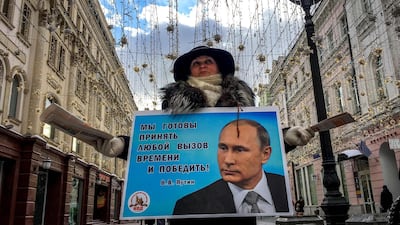Russia is on Sunday set to elect President Vladimir Putin to a historic fourth Kremlin term, with pollsters predicting a landslide win despite a lacklustre campaign.
In the run-up to the election, he and a compliant state media have sought to reinforce Mr Putin's image as that of the man who restored stability and national pride after the humiliating collapse of the USSR.
Mr Putin, who has ruled Russia for almost two decades, has also sought to emphasise Russia's role as a world power, recently boasting of its "invincible" new weapons and displaying Moscow's support for the Syrian regime in its civil war.
Re-election would extend Mr Putin's term to 2024. The vote comes as Russia faces increasing isolation over the poisoning of a suspected spy in Britain and a new round of US sanctions over alleged election meddling.
The poisoning of former double agent Sergei Skripal in Britain, which the West has blamed on Russia, has put the country at loggerheads with the rest of the world.
"In America and Europe, they are trying to make us bend over and kneel, but we're still standing," Sergei Babayev, a 55-year-old transport manager, told AFP in central Moscow.
"They promised us a crisis and we stuck it out. That's Putin's main quality – he is at the core of our state."
Mr Putin, who has run under the slogan "a strong president – a strong Russia", has declined to take part in televised debates and produced no new material for his own campaign advertisements. Analysts have put his support at about 70 per cent, ahead of the vote.
_________________
Kremlin furious as Britain links Putin to ex-spy attack
Western leaders unite to condemn Russia over spy attack
_________________
He is standing against seven other candidates, including millionaire communist Pavel Grudinin and former reality TV host Ksenia Sobchak, but none are polling more than 8 per cent.
One of the more memorable moments from the campaign came during a debate when Miss Sobchak threw a glass of water over the ranting ultra-nationalist candidate Vladimir Zhirinovsky, prompting him to call her a "prostitute" and a "mad fool".
Mr Putin's most vocal opponent, the anti-corruption campaigner Alexei Navalny, has been barred from standing for legal reasons and has called on followers to boycott the election, which he claims is a sham.
Authorities, however, are seeking a high turnout to add greater legitimacy to a new term for Mr Putin, who is already Russia's second-longest serving leader since Joseph Stalin.
"These are not quite the elections we see in western countries," Stepan Goncharov of the independent Levada Center pollster said.
"People are put in a situation where they have no one to choose from," he said.
"If they want to express their disapproval, then they don't turn out. They think of it as a vote of confidence [in Mr Putin]."
There has been a particular focus on the youth vote, with prizes offered for the best selfies taken at polling stations and a sexually charged online campaign that brands the election as "for adults only".
Meanwhile, students in several cities have been warned they may face problems in examinations or even expulsion if they do not turn out to vote, according to liberal newspaper Novaya Gazeta.
Heads of schools and state enterprises have put pressure on their employees to vote, as in previous elections, in some cases telling workers they should bring in a list of names of friends or relatives who were also going to the polls.
Early voting has already taken place in some remote areas, where local election commissions bring ballot boxes by helicopter and snowmobile.
Polls open in Russia's far east at 2000 GMT on Saturday and close in Kaliningrad, the country's exclave in Europe, at 1800 GMT on Sunday. Overall turnout is expected to be between 63 and 67 per cent, according to official pollsters.
The run-up to Russia's last presidential election in 2012 was marked by protests across the country against Mr Putin's return as head of state after four years as prime minister.
But those demonstrations were quashed. Oonce he was back in the Kremlin a clampdown followed with activists arrested, the Pussy Riot rock band jailed and draconian new laws criminalising popular protest passed.

